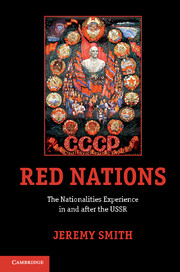Book contents
- Frontmatter
- Dedication
- Contents
- Tables
- Preface
- 1 Introduction: the prison-house of nations
- 2 Dispersal and reunion: revolution and civil war in the borderlands
- 3 Bolshevik nationality policies and the formation of the USSR: the Bolsheviks dispute national policy
- 4 Nation-building the Soviet way
- 5 Surviving the Stalinist onslaught, 1928–1941
- 6 The Great Patriotic War and after
- 7 Deportations
- 8 Territorial expansion and the Baltic exception
- 9 Destalinisation and the revival of the republics
- 10 Stability and national development: the Brezhnev years, 1964–1982
- 11 From reform to dissolution, 1982–1991
- 12 Nation-making in the post-Soviet states
- 13 The orphans of the Soviet Union: Chechnya, Nagorno Karabakh, Abkhazia, South Ossetia and Transdniester
- Conclusion
- Bibliography
- Index
- References
7 - Deportations
Published online by Cambridge University Press: 05 June 2014
- Frontmatter
- Dedication
- Contents
- Tables
- Preface
- 1 Introduction: the prison-house of nations
- 2 Dispersal and reunion: revolution and civil war in the borderlands
- 3 Bolshevik nationality policies and the formation of the USSR: the Bolsheviks dispute national policy
- 4 Nation-building the Soviet way
- 5 Surviving the Stalinist onslaught, 1928–1941
- 6 The Great Patriotic War and after
- 7 Deportations
- 8 Territorial expansion and the Baltic exception
- 9 Destalinisation and the revival of the republics
- 10 Stability and national development: the Brezhnev years, 1964–1982
- 11 From reform to dissolution, 1982–1991
- 12 Nation-making in the post-Soviet states
- 13 The orphans of the Soviet Union: Chechnya, Nagorno Karabakh, Abkhazia, South Ossetia and Transdniester
- Conclusion
- Bibliography
- Index
- References
Summary
The previous chapter sketched some of the broad experiences of the non-Russian nationalities during and after the Second World War. There was considerable variation across the Soviet Union, with the western and North Caucasus nationalities who suffered German occupation experiencing the war differently from other nationalities, while the Jews faced persecution of different sorts by the Nazis during the war and by the Soviets after it. But two further groups of nationalities deserve especial attention. In this chapter, the fate of the relatively small nationalities from the Caucasus and Crimea who were deported en masse from their home republics or regions in 1944 is examined, while the next chapter looks at the nationalities who were incorporated into the Soviet Union, first under the terms of the Molotov–Ribbentrop pact in 1939–1940, and again at the end of the war as the Red Army drove out the occupying Germans – Estonians, Latvians, Lithuanians, the Ukrainians and Belorussians whose territory was annexed from Poland, and the Moldovans of Romania. Both sets of nationalities are important not just to complete the picture of the nationalities experience in the 1940s, but also because of their lasting impact and eventual contribution to the break-up of the USSR. The population of the Baltic republics played a direct role in the demise of the Soviet Union, but the deported peoples also presented a constant reminder of the mass scale of repression under Stalin and affected late Soviet politics in several ways. How to manage them was one of the first questions to be addressed by Nikita Khrushchev under destalinisation, but those who were still denied the right to return to their homelands pressed their demands by letter, petition and demonstration right through to the 1980s, while those who did return contributed to some of the ethnic conflicts that marked the final years of Soviet rule.
Information
- Type
- Chapter
- Information
- Red NationsThe Nationalities Experience in and after the USSR, pp. 147 - 162Publisher: Cambridge University PressPrint publication year: 2013
